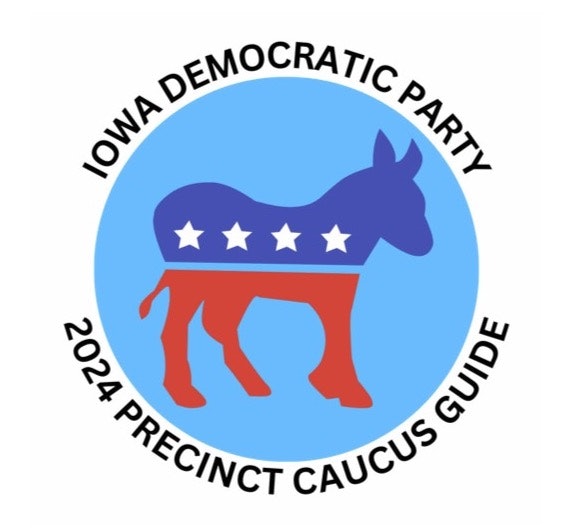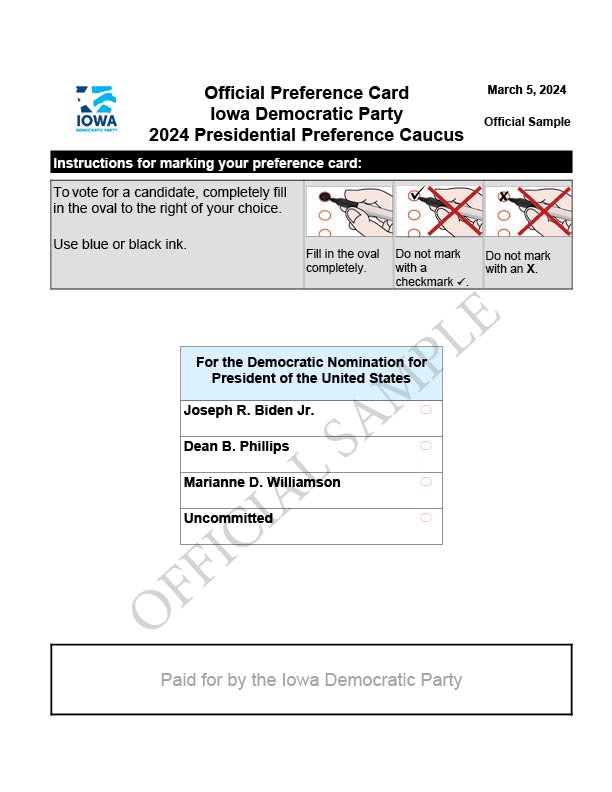
For once, I don’t have to write a whole Iowa caucus series explaining the complexities of delegate allocations or the viability threshold. Democratic caucus-goers won’t spend ages counting, realigning, or complaining about how the math worked out.
The 2024 Iowa Democratic caucuses should be drama-free affairs that wrap up in an hour or less.
While the Republican gatherings on January 15 will generate more excitement and suspense as attendees wait to find out who finished a distant second to Donald Trump, Democrats who brave the cold can expect a smaller and friendlier local meeting.
JANUARY 15 MEETINGS ARE ONLY FOR PARTY BUSINESS
Iowa Democratic Party chair Rita Hart told reporters during a January 12 virtual news conference that the party has “held dozens of training sessions” with local volunteers “to make sure that Democrats are prepared to run a successful in-person caucus.”
The party distributed this caucus guide to all precinct chairs, with a proposed schedule and sample script for proceedings.
The Democratic caucuses will begin at 7:00 pm on January 15, just like the Republican caucuses. It’s good to arrive early, leaving plenty of time to park and find the meeting room, but there should not be long lines to sign in at any Democratic precinct this year.
This Google doc shows Democratic caucus locations statewide. For most Iowans, that won’t be the same as your regular polling place. Some counties have consolidated all precincts to meet in one building, because of the low expected turnout. The party organized things the same way in 2012, the last time it held caucuses while a Democratic president was seeking re-election.
The caucuses are only for registered Democrats, but any eligible voter for the November 2024 general election can register to vote or change their party affiliation right at the precinct when signing in. Bring some proof of address (like a rental agreement, bank statement, or utility bill) if you need to change your address or register for the first time.
Democratic caucuses are open meetings, so any member of the public can observe the process. Those who aren’t eligible to vote or don’t live in the precinct can’t participate in the party business, though.
After the temporary chair calls the caucus to order at 7:00, those attending usually elect a permanent chair and secretary. (At consolidated locations, everyone from one county may be together for the first part of the program, so precinct officers are elected after breaking into separate caucuses.)
The Iowa Democratic Party is asking precinct chairs to read a letter from Hart and a letter from the Iowa Democratic Black Caucus, honoring the legacy of the Rev. Dr. Martin Luther King, Jr. on the holiday named for him.
Chairs are also supposed to pass around a fundraising envelope “to help raise money for the IDP to help offset the cost of putting together the caucuses.”
Next, the schedule calls for county party leaders to introduce themselves to attendees, describe some highlights from their activity over the past two years, and let people know about upcoming events or ways to volunteers.
If any Democratic elected officials and candidates for any office (or their surrogates) are present, precinct chairs will recognize them and give them a chance to speak for a few minutes. At most caucuses, the chair sets up a table with nominating petitions for Democratic candidates in their area and encourages attendees to sign.
ELECTIONS FOR PARTY POSITIONS
In past cycles, Iowa Democratic county convention delegates were tied to presidential preference results from each precinct. But this year, anyone can put their name in for a county convention delegate or alternate slot. For those who have considered getting involved with a county party, now is the time. It’s probably never been easier to be elected to these positions:
- county central committee members (many precincts will elect two; some will elect more)
- delegates and alternates to the county conventions, scheduled for March 23 (the number depends on how many residents of the precinct voted for the most recent Democratic nominees for governor and president)
- members of the county Platform Committee and Committee on Committees, which handles logistics for the county conventions (only county convention delegates or alternates can serve on these committees)
My Windsor Heights precinct had relatively strong attendance (33 people) at our 2012 caucus, but I recall some other precincts that met in the same building had only a handful of Democrats show up.
Given the lack of a presidential preference component this year and the incredibly cold weather forecast for January 15, I asked the Iowa Democratic Party what will happen if no one shows up at a certain precinct, or if the precinct chair is the only attendee. I was told a caucus with no attendees cannot elect county convention delegates or alternates, and “those positions cannot be backfilled.”
However, the county central committee could later schedule an election for members or alternates from that precinct at one of their regular monthly meetings, “as long as the election is properly noticed.”
If any caucuses have only one person present, the precinct chair “can nominate and elect anyone who is a registered Democrat living in that precinct to any or all positions (even themselves).”
Precinct chairs are required to read the following passage to the group before voting:
All caucuses, conventions, committees and Democratic Party officials shall take such practical steps as may be within their legitimate power to assure all caucuses, conventions and committees shall include: men, women, various age groups, racial minority groups, economic groups, all representatives of identifiable geographically defined populations—all in reasonable to the proportions in which the groups are found in the populations of the respective constituencies. In the spirit of the above, all caucuses, conventions, and committees will also endeavor to include citizens of all national origins, ethnic identities, religions, sexual orientations, gender identities, and disabilities.
ADOPTING PLATFORM RESOLUTIONS
The next item on the agenda is considering proposals for the Democratic platform.
Some precinct caucuses will spend time debating each resolution. In my experience, the chair will often call for a vote on all of them as a bloc. The county platform committee will consider them individually later.
Iowa Democratic Party staff told me, “If someone would like to submit a platform resolution, they have to do so in writing. Some of our locations will provide paper and submission forms – but we are asking that if anyone would like to submit a resolution to make sure that they leave their name and contact information so that our county leadership can have the correct information.”
Bleeding Heartland has previously explained how to write an Iowa caucus platform resolution. That post includes several examples, to give you an idea of the format.
PRESIDENTIAL SELECTION WILL HAPPEN BY MAIL
To comply with the Democratic National Committee calendar, which left Iowa outside the early state window, Iowa Democrats are conducting this year’s presidential preference by mail only, and won’t announce the results until March 5 (Super Tuesday).
During the January 12 virtual news conference, Hart hailed “the beginning of what will be the most inclusive Iowa caucus process in Iowa history.”
For the first time a fire fighter or a police officer working a third shift, or a parent who may not have child care, or a snow bird who is spending the month in Arizona or Florida, and those in our disability community who struggle with home health care can now make sure that their voices are heard in the presidential preference process.
Amen to that. For too long, Iowa Democrats didn’t address the many barriers to participating in a caucus.
Hart said more than 8,000 Democrats have already requested a preference card. Iowa Democrats can request a card online or through the mail until February 19.
The cards will give voters four options: Joe Biden, Dean Phillips, Marianne Williamson, or “uncommitted.” As with a ballot for any election, voters fill in the oval next to their choice. The state party provided this sample:


1 Comment
nice job on C-SPAN
hopefully the Dem leadership can come to see that it is a good thing for majority white electorates to literally follow the lead of more diverse ones.
dirkiniowacity Sun 14 Jan 1:24 PM